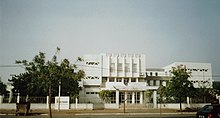Our website is made possible by displaying online advertisements to our visitors.
Please consider supporting us by disabling your ad blocker.
Education in Cape Verde
| Ministry of Education, Family, and Social Inclusion | |
|---|---|
| Minister | Amadeu Cruz |
| General details | |
| Primary languages | Portuguese, Cape Verdean Creole |
| Literacy (2010) | |
| Total | c. 75-80% |


Primary school education in Cape Verde is mandatory between the ages of 6–18 and free for children ages 6–18.[1] In 1997, the gross primary enrollment rate was 148.8%.[1] Primary school attendance rates were unavailable for Cape Verde as of 2001.[1] While enrollment rates indicate a level of commitment to education, they do not always reflect children's participation in school.[1] Textbooks have been made available to 90% of school children, and 90% of teachers have attended in-service teacher training.[1] Its literacy rate as of 2010 ranges from 75 to 80%, the highest in West Africa south of the Sahara.
Although most children have access to education, some problems remain.[1] For example, many students and some teachers speak Cape Verdean Creole at home and have a poor command of Portuguese (the language of instruction); there is insufficient spending on school materials, lunches, and books; and there is a high repetition rate for certain grades.[1]
The Human Rights Measurement Initiative (HRMI)[2] finds that Cabo Verde is fulfilling only 82.0% of what it should be fulfilling for the right to education based on the country's level of income.[3] HRMI breaks down the right to education by looking at the rights to both primary education and secondary education. While taking into consideration Cabo Verde's income level, the nation is achieving 88.1% of what should be possible based on its resources (income) for primary education but only 75.9% for secondary education.[4]
- ^ a b c d e f g "Cape Verde" Archived May 7, 2008, at the Wayback Machine. Findings on the Worst Forms of Child Labor (2001). Bureau of International Labor Affairs, U.S. Department of Labor (2002). This article incorporates text from this source, which is in the public domain.
- ^ "Human Rights Measurement Initiative – The first global initiative to track the human rights performance of countries". humanrightsmeasurement.org. Retrieved 2022-03-15.
- ^ "Cabo Verde - HRMI Rights Tracker". rightstracker.org. Retrieved 2022-03-15.
- ^ "Cabo Verde - HRMI Rights Tracker". rightstracker.org. Retrieved 2022-03-15.
Previous Page Next Page


